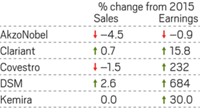Advertisement
Grab your lab coat. Let's get started
Welcome!
Welcome!
Create an account below to get 6 C&EN articles per month, receive newsletters and more - all free.
It seems this is your first time logging in online. Please enter the following information to continue.
As an ACS member you automatically get access to this site. All we need is few more details to create your reading experience.
Not you? Sign in with a different account.
Not you? Sign in with a different account.
ERROR 1
ERROR 1
ERROR 2
ERROR 2
ERROR 2
ERROR 2
ERROR 2
Password and Confirm password must match.
If you have an ACS member number, please enter it here so we can link this account to your membership. (optional)
ERROR 2
ACS values your privacy. By submitting your information, you are gaining access to C&EN and subscribing to our weekly newsletter. We use the information you provide to make your reading experience better, and we will never sell your data to third party members.
Business
Business Slows In Europe
Chemicals: Second-quarter results are better than last year’s, but firms see demand softening
by Melody M. Bomgardner
August 8, 2011
| A version of this story appeared in
Volume 89, Issue 32
European chemical companies increased earnings in the second quarter, despite rising costs for energy and raw materials. Unlike their counterparts in the U.S., however, leading firms BASF and Bayer posted results that fell short of expectations.
At BASF, sales increased 14% to $26.8 billion compared with the second quarter of 2010. Earnings rose 23% to $2.11 billion. But the company’s earnings per share of $2.30 were almost 10 cents below analysts’ targets.
BASF Chairman Kurt Bock suggested that outside forces rather than company performance constrained growth for the quarter. “Compared with the extraordinary growth in the first quarter, the growth rates have normalized in the second quarter as expected. In addition, for the first time since the first quarter of 2010, currency effects were negative (–6%) due to the weak U.S. dollar,” he said in remarks about the quarter.
Analysts had expected stronger earnings from BASF’s chemicals business, especially after the acquisition of Cognis, which was completed in December 2010. “The main disappointment came from performance products, which were down by almost €100 million [$145 million] quarter over quarter and only up 9% year over year despite the consolidation of Cognis,” Andreas Heine, European chemicals analyst at UniCredit Research, told investors in a research note. “This was due to falling results from health and nutrition, paper chemicals, and performance chemicals.”
At German compatriot Bayer, sales for the quarter edged up less than 1%, to $13.4 billion, and earnings of $1.1 billion were below analysts’ predictions. Like Bock, Bayer CEO Marijn Dekkers seemed to brush aside market expectations. “We are pleased with the way our business performed,” he told investors. “We have also achieved significant progress with products from our research and development pipeline.”
Sales at Bayer’s health care segment were flat compared with the same quarter last year, while higher prices for crop science and materials science products boosted revenues. However, volumes for the materials segment were lower than in last year’s second quarter. And the strong euro hurt the company’s reported sales figures.
Merck KGaA results suffered from weakness in pharmaceuticals. The German company took an impairment loss of $234 million due to overcapacity at a biotech production plant in Corsier-sur-Vevey, Switzerland, and it set aside $29 million for the remaining costs associated with halting the development of cladribine, a multiple sclerosis drug candidate. But Merck’s overall sales increased by 16% to $3.7 billion, in large part due to its acquisition of U.S.-based Millipore, which is now Merck’s bioscience and lab solutions business.
Swiss firm Clariant included two months’ worth of Süd-Chemie revenues in its results for the quarter. The acquisition helped boost sales in the quarter by 14% in local currencies, but the exceptionally strong Swiss franc ate the increase and then some, resulting in a 1% shrinkage in reported sales. The company also reported 5% higher raw material costs and some demand softening for specialty chemicals.
In contrast, Rhodia increased sales by 22%, driven mostly by price increases but also by higher sales in China. Solvay, which also had a strong quarter, recently made a $4.8 billion cash offer for Rhodia (C&EN, April 11, page 9).
European chemical executives stood by their projections for full-year financial results but signaled that growth would slow in the second half. Bock summed up the challenges: “We continue to be concerned about the development of the euro, as well as the debt situation in some European countries and the U.S.,” he said. “Added to this is the persistently high oil price, which is having a negative impact on margins across our value chains and is leading to some customers being more cautious in their orders.”






Join the conversation
Contact the reporter
Submit a Letter to the Editor for publication
Engage with us on Twitter